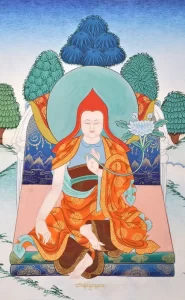
Khyergangpa was born to the Ba family in Nang County. Upon reaching his teenage years, he already showed great diligence in his studies and practiced intensely. When he was sixteen he joined the entourage of his uncle and mentor, the abbot Tamche Khyenpa, and travelled with him to Draklha.
In his life, Khyergangpa would have four great Lamas: Lama Chegom, Lama Tsari Gompa, Lama Penpukpa and the Exalted Mochokpa.
From the glorious Chegom he received the complete Avalokiteshvara teachings. Concentrating on these during four and a half years of solitary practice, Avalokiteshvara appeared to him in a vision.
When he was in Lato, he received the complete instructions of Rechungpa from his Lama Tsari Gompa. He also received all the practices and instructions of lord Atisha from the great Lama Penpukpa in whose company he spent five years.
Mochokpa, the Shangpa lineage holder, recognised that Khyergangpa was destined to be his fortunate disciple, and he therefore transmitted the entire precious Shangpa teachings to him. Khyergangpa, as a result, mastered the practices of Clear Light, Dream Yoga, and Illusory Body and had uninterrupted visions of many deities. Khyergangpa was still in his presence when he received the news that his uncle Ba Tamche Khyenpa had passed away. Followed his Master’s advice, he took over and reconstructed his uncle’s monastery, thereby also fulfilling a request from the people of Khyergang. His precious root Lama, Mochokpa, died several years later.
Amongst the disciples of Khyergangpa and lamas in the Shang district, many had visions of Avalokiteshvara. His three greatest disciples were Nakpo Zhontrul, Drakpa Yeshi and Rigongpa. As prophesised by Mochokpa on his death bed, it was Rigongpa who would continue to hold the Shangpa lineage.
Upon leaving this world, Khyergangpa entrusted his students with the following advice:
”Remember when you perform your so called Dharma practice and are mindless of the Genuine Dharma, that death may come tomorrow or the next day. Oh yes, when you are in the face of death, you will cry out a late promise: “If I don’t die now, I’ll do nothing but pure practice!” It is our nature to die. As for me, in the beginning when it was time to think about the Dharma, I thought about Dharma. In the middle when it was time to practice Dharma, I practiced Dharma. And now in the end when I need the Dharma, I have it!”
